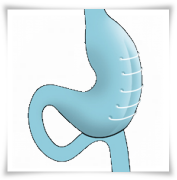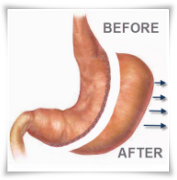Gastric Sleeve vs Gastric Bypass
When you are evaluating the Gastric Sleeve vs Gastric Bypass surgery, it is important that you understand the implications, pros and cons of each type of bariatric surgery. Only by comparing the gastric sleeve vs gastric bypass and understanding how each one works can you make the choice that best suits your specific case. First, you must understand how each type of weight loss surgery works.
 Gastric Sleeve vs Gastric Bypass: What is the Gastric Sleeve?
Gastric Sleeve vs Gastric Bypass: What is the Gastric Sleeve?
The gastric sleeve surgery is a weight loss procedure that basically reduces the stomach size, and in doing so, limits the intake of food at any given time. During the surgery, the weight loss surgeon will take 76% to 85% of the stomach. The altered stomach is like the shape of the slim tube, or a sleeve, which connects your esophagus to your small intestine.
Click here to read more about the Gastric Sleeve.
Your pyloric valve, the outlet that controls the discharge of the food from your stomach to your small intestine, stays intact keeping its normal function. Gastric sleeve surgery can help to curb hunger because the portion of the stomach that produces Ghrelin, the hormone that stimulates hunger, has been removed.
The gastric sleeve procedure is progressively being done as a stand-alone method, but most of the time, it is regarded as the initial step of a two part procedure. For those patients who are really overweight or may be suffering from a number of health problems, and may not qualify for a gastric bypass, then the gastric sleeve may be done to aid the patient in losing the excess weight.
A few years after the weight loss procedure, and after the patient has lost a lot of weight, they may now proceed to the second stage of the procedure which is the duodenal switch, that is if additional weight loss is needed. To make a good comparison of the gastric sleeve vs gastric bypass we must now look at the the gastric bypass.
Gastric Sleeve vs Gastric Bypass: What is the Gastric Bypass?
A gastric bypass, also called the Roux-en-Y, is made of two parts. The first part is creating two pouches out of your stomach, a smaller top pouch and a larger lower pouch. This is typically done using surgical staples, and is also referred to as stomach stapling. The second part consists of the bypass. The new small stomach will be disconnected from your duodenum, which is the opening to the small intestine, and is then reconnected to the jejunum, which is a lower part of your intestine.
When you eat food, it will be broken down in the small stomach, and then pass directly to the jejunum which means less nutrients and calories are absorbed. With this weight loss procedure, you will have a feeling of fullness after you eat a small portion of food, which will lead to weight loss. Now that we understand both procedures a bit more, we’ll compare the gastric sleeve vs gastric bypass.
Gastric Sleeve vs Gastric Bypass: Similarities
Here we will briefly look at the similarities of the gastric sleeve vs gastric bypass:
- Both procedures involve creating a smaller stomach.
- Both procedures involve the use of surgical staples.
- Both procedures limit the food intake.
- Both procedures can significantly improve your health by shedding excess weight.
Gastric Sleeve vs Gastric Bypass: Differences
Here we will briefly look at the differences of the gastric sleeve vs gastric bypass:
- The Gastric Bypass involves altering your digestive system, the Gastric Sleeve does not. The Gastric Sleeve only alters the stomach.
- The Gastric Bypass only staples the stomach to create the two pouches, stomach tissue is not removed.
- The Gastric Bypass is a Malabsorptive technique, the Gastric Sleeve is a Restrictive technique.
- The recovery period for the Bypass is longer due to the more involved surgical procedure.
- The Gastric Sleeve operation can be done laproscopically, the Gastric Bypass cannot.
Advantages of the Gastric Sleeve
Here are some of the advantages of the Gastric Sleeve vs Gastric Bypass.
- Minimally invasive compared to the Gastric Bypass.
- No change to the digestive system and no intestinal bypass.
- No chance for complications typically associated with malabsorptive techniques, such as Dumping syndrome.
- Can be done laproscopically.
Gastric Sleeve vs Gastric Bypass
Although both procedures are a good option for weight loss, the differences become more apparent after looking at the gastric sleeve vs gastric bypass. However, the Gastric Sleeve seems to have the advantage after comparing the gastric sleeve vs gastric bypass. The Gastric Sleeve will leave less scarring because the entire procedure can be laproscopically. The digestive system is not rerouted, so digestion happens naturally with the Gastric Sleeve vs Gastric Bypass which does alter the intestines, which can lead to Dumping Syndrome. Since the procedure is much less complicated than a bypass, many patients who do not qualify for the bypass procedure may be qualified candidates for the Gastric Sleeve.
If you or someone you know is considering the gastric sleeve vs gastric bypass to help battle obesity, the best advice would be to speak with a bariatric surgeon. Everyone is different, and there is no ‘one-size-fits-all’ solution when it comes to obesity. Get all the facts, know your options, and then you can make the decision best for you after comparing the Gastric Sleeve vs Gastric Bypass.

